25. Flock Of Dimes | If You See Me, Say Yes (Partisan)
 It’s tempting to view this Flock Of Dimes release party as the genre-neutral ground where Jenn Wasner’s worlds collide: the moody blues of Wye Oak and the sheer letting-go of Dungeonesse. And it could’ve been merely that. It ended up a gathering of her multiple musical personalities—a one-woman Traveling Wilburys, if you will, and you definitely should. Joni Mitchell, Christine McVie, Tracey Thorn and Annie Lennox join Wasner in this imaginary supergroup, with a dozen other contemporaries on hand as understudies: Joanna Newsom’s elemental sentiment (“Fill my arms with what I can carry”), Victoria Legrand’s lapping drones, Beth Orton’s hybrid tones. Just when you think you can see the calligraphic flourishes coming, Wasner unleashes a new, startling wake-up call, be it a timeless signature (on her declaration of independence, “Birthplace”), an overwhelming affirmation (carpe diem anthem “Everything Is Happening Today”) or a corporeal rave (pleasure-principled “Ida Glow”). She may only have this one body, but her spirit is an infinite spectrum in which the snarling guitar goddess we thought we knew is but a single shade. —Noah Bonaparte Pais
It’s tempting to view this Flock Of Dimes release party as the genre-neutral ground where Jenn Wasner’s worlds collide: the moody blues of Wye Oak and the sheer letting-go of Dungeonesse. And it could’ve been merely that. It ended up a gathering of her multiple musical personalities—a one-woman Traveling Wilburys, if you will, and you definitely should. Joni Mitchell, Christine McVie, Tracey Thorn and Annie Lennox join Wasner in this imaginary supergroup, with a dozen other contemporaries on hand as understudies: Joanna Newsom’s elemental sentiment (“Fill my arms with what I can carry”), Victoria Legrand’s lapping drones, Beth Orton’s hybrid tones. Just when you think you can see the calligraphic flourishes coming, Wasner unleashes a new, startling wake-up call, be it a timeless signature (on her declaration of independence, “Birthplace”), an overwhelming affirmation (carpe diem anthem “Everything Is Happening Today”) or a corporeal rave (pleasure-principled “Ida Glow”). She may only have this one body, but her spirit is an infinite spectrum in which the snarling guitar goddess we thought we knew is but a single shade. —Noah Bonaparte Pais
……………………………………………………………………………………………………….
24. ANOHNI | Hopelessness (Secretly Canadian)
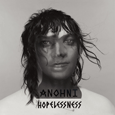 2016 was a good year for protest records, and none was more bitter or more beautiful than Hopelessness. It’s a reinvention album: Antony Hegarty rechristened herself ANOHNI and eschewed the piano-based art songs of her former band Antony And The Johnsons, instead embracing somber electronics created in collaboration with Oneohtrix Point Never and Hudson Mohawke. These are intensely gorgeous songs even when the subject matter is ugly: On “Drone Bomb Me,” ANOHNI sings from the perspective of an orphan hoping to die in an attack, as his parents did; “Obama” condemns the president for unfulfilled promises and unprovoked aggression; “Why Did You Separate Me From The Earth?” questions the future of the planet. She often sings from the point of view of the villain she condemns: “I want to hear the dogs crying for water/I want to see the fish go belly up in the sea,” she claims on “4 Degrees.” The lyrics are unrelenting in their anger and pointedly accusatory—of specific countries, of terrorism and warfare, of environmental abuse, of self. But ANOHNI’s voice, a dramatic, sometimes operatic, often soulful croon, conveys warmth, tenderness and, contradictory to the title, hope. —Steve Klinge
2016 was a good year for protest records, and none was more bitter or more beautiful than Hopelessness. It’s a reinvention album: Antony Hegarty rechristened herself ANOHNI and eschewed the piano-based art songs of her former band Antony And The Johnsons, instead embracing somber electronics created in collaboration with Oneohtrix Point Never and Hudson Mohawke. These are intensely gorgeous songs even when the subject matter is ugly: On “Drone Bomb Me,” ANOHNI sings from the perspective of an orphan hoping to die in an attack, as his parents did; “Obama” condemns the president for unfulfilled promises and unprovoked aggression; “Why Did You Separate Me From The Earth?” questions the future of the planet. She often sings from the point of view of the villain she condemns: “I want to hear the dogs crying for water/I want to see the fish go belly up in the sea,” she claims on “4 Degrees.” The lyrics are unrelenting in their anger and pointedly accusatory—of specific countries, of terrorism and warfare, of environmental abuse, of self. But ANOHNI’s voice, a dramatic, sometimes operatic, often soulful croon, conveys warmth, tenderness and, contradictory to the title, hope. —Steve Klinge
……………………………………………………………………………………………………….
23. Bird Of Youth | Get Off (Kiam)
 Beth Wawerna wrote the songs on Get Off during one of the most trying periods of her life. She was taking care of her father, who was dying of cancer, and after he passed, her anguish overwhelmed her. She slipped into depression and dealt with her feelings by writing the songs that make up this album. The music is rock, but it’s played with a restrained intensity that honors the emotional force of the lyrics. Wawerna uses the phrasing of a jazz singer, drawing out her vowels and inserting her words into the melodies before, after and against the rhythm. This almost somnambulant approach intensifies the lyrics’ emotional effect. The poignant melodies she crafted with guitarist Clint Newman reverberate on a deep level, and like all great songs, they sound like something you’ve heard all your life, even though you know you’re hearing it for the first time. “Passing Phase,” a mid-tempo tune that suggests New Order playing California surf-guitar licks, deals with the feelings of alienation that allow us to engage in self-destructive behavior, while “Bitter Filth” is a violent, aggressive, Clash-like punk tune that expresses the anger that’s often at the heart of grief and remorse. —j. poet
Beth Wawerna wrote the songs on Get Off during one of the most trying periods of her life. She was taking care of her father, who was dying of cancer, and after he passed, her anguish overwhelmed her. She slipped into depression and dealt with her feelings by writing the songs that make up this album. The music is rock, but it’s played with a restrained intensity that honors the emotional force of the lyrics. Wawerna uses the phrasing of a jazz singer, drawing out her vowels and inserting her words into the melodies before, after and against the rhythm. This almost somnambulant approach intensifies the lyrics’ emotional effect. The poignant melodies she crafted with guitarist Clint Newman reverberate on a deep level, and like all great songs, they sound like something you’ve heard all your life, even though you know you’re hearing it for the first time. “Passing Phase,” a mid-tempo tune that suggests New Order playing California surf-guitar licks, deals with the feelings of alienation that allow us to engage in self-destructive behavior, while “Bitter Filth” is a violent, aggressive, Clash-like punk tune that expresses the anger that’s often at the heart of grief and remorse. —j. poet
……………………………………………………………………………………………………….
22. Nada Surf | You Know Who You Are (Barsuk)
 Nada Surf songwriter Matthew Caws tends to wear his heart on his sleeve, and relationships remain a recurring theme on the bittersweet You Know Who You Are, this great band’s eighth LP (seventh if you don’t count 2010’s covers effort If I Had A Hi-Fi). Recently married, Caws doesn’t shy away from past hurt; on the Stones-y “Animal,” he laments, “I forgot that’s what people do/They pair off two by two/Until one of them turns blue.” But the gorgeous, jangly “Rushing” finds him physically and mentally enthralled by love: “I haven’t landed since I don’t know when/Now I feel like I can breathe again.” If there’s any quibble about You Know Who You Are, it could use more of the modest, talented—but not modestly talented—guitarist Doug Gillard. While it’s not as if his contributions aren’t vital to the vibe throughout, his exquisite 35-second solo on “Friend Hospital” is the only time he’s really unleashed; it’s a shining moment that begs for a repeat. But this is nitpicking: You Know Who You Are is further evidence that Nada Surf’s impeccable catalog stands among the finest of its generation. Those who get it? You know who—well, you know. Matt Hickey
Nada Surf songwriter Matthew Caws tends to wear his heart on his sleeve, and relationships remain a recurring theme on the bittersweet You Know Who You Are, this great band’s eighth LP (seventh if you don’t count 2010’s covers effort If I Had A Hi-Fi). Recently married, Caws doesn’t shy away from past hurt; on the Stones-y “Animal,” he laments, “I forgot that’s what people do/They pair off two by two/Until one of them turns blue.” But the gorgeous, jangly “Rushing” finds him physically and mentally enthralled by love: “I haven’t landed since I don’t know when/Now I feel like I can breathe again.” If there’s any quibble about You Know Who You Are, it could use more of the modest, talented—but not modestly talented—guitarist Doug Gillard. While it’s not as if his contributions aren’t vital to the vibe throughout, his exquisite 35-second solo on “Friend Hospital” is the only time he’s really unleashed; it’s a shining moment that begs for a repeat. But this is nitpicking: You Know Who You Are is further evidence that Nada Surf’s impeccable catalog stands among the finest of its generation. Those who get it? You know who—well, you know. Matt Hickey
……………………………………………………………………………………………………….
21. Wilco | Schmilco (dBpm)
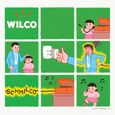 Wilco’s Star Wars wasn’t just MAGNET’s 2015 album of the year; it was also a surprising soft reboot. After a few LPs of trying to be all things to all fans, the band found new life by hunkering down in one general direction—cheerfully bent, borderline-glam guitar pop—for 34 quick minutes. One year later, Schmilco continues Wilco’s creative winning streak. This time, the band gets extra minimalist with 12 songs largely built off of Jeff Tweedy’s folky acoustic guitar and Glenn Kotche’s patiently intricate drum work. You’ll be amazed how gently the six-person band can play these whispery tunes, with each member still putting his stamp on the proceedings. Schmilco’s jokey title paired with typically macabre cover art from Spanish cartoonist Joan Cornellà might suggest some cognitive dissonance, but Wilco is on assured ground here. The band can subtly twist the album’s sound from gossamer pop (“Happiness”) to knotty post-rock (“Locator”). And the songs, especially “If I Ever Was A Child” and “We Aren’t The World (Safety Girl),” provide a salve for listeners, whether they’re dealing with a stressful job, a heartache or just aghast about the shitshow of 2016. —Michael Pelusi
Wilco’s Star Wars wasn’t just MAGNET’s 2015 album of the year; it was also a surprising soft reboot. After a few LPs of trying to be all things to all fans, the band found new life by hunkering down in one general direction—cheerfully bent, borderline-glam guitar pop—for 34 quick minutes. One year later, Schmilco continues Wilco’s creative winning streak. This time, the band gets extra minimalist with 12 songs largely built off of Jeff Tweedy’s folky acoustic guitar and Glenn Kotche’s patiently intricate drum work. You’ll be amazed how gently the six-person band can play these whispery tunes, with each member still putting his stamp on the proceedings. Schmilco’s jokey title paired with typically macabre cover art from Spanish cartoonist Joan Cornellà might suggest some cognitive dissonance, but Wilco is on assured ground here. The band can subtly twist the album’s sound from gossamer pop (“Happiness”) to knotty post-rock (“Locator”). And the songs, especially “If I Ever Was A Child” and “We Aren’t The World (Safety Girl),” provide a salve for listeners, whether they’re dealing with a stressful job, a heartache or just aghast about the shitshow of 2016. —Michael Pelusi
……………………………………………………………………………………………………….
20. Bob Mould | Patch The Sky (Merge)
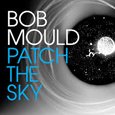 “Will the earthquakes shake our cottage to the ground?/Hear the silence, there’ll be no one left around,” snarls Bob Mould on “The End Of Things,” the strongest track on his strongest solo work to date. “Opportunity denied, now we watch it fade away/It’s the end of things, the end of everything.” These dire, desolate lyrics are enough to make you reach for the razor blade and fill the bathtub, yet they’re wed to the most explosive-yet-shiny pop Mould’s managed in ages. The moment Patch The Sky was released, I was in my own personal hell, mourning the loss of a cherished romance that had governed the past year, whose end was not my idea. And here came Bob Mould to the rescue, every word a live grenade lobbed back at the world, married to the incendiary melodic blast-punk he’d always done best. It was the greatest post-breakup salve this broken heart could’ve received, and the best Hüsker Dü record his initial claim to fame never got around to making. “All these dreams I can’t achieve/Brought me crashing to my knees,” concludes “The End Of Things.” “My descent has now begun/All the music left undone.” Thanks for throwing that life preserver, Bob. —Tim Stegall
“Will the earthquakes shake our cottage to the ground?/Hear the silence, there’ll be no one left around,” snarls Bob Mould on “The End Of Things,” the strongest track on his strongest solo work to date. “Opportunity denied, now we watch it fade away/It’s the end of things, the end of everything.” These dire, desolate lyrics are enough to make you reach for the razor blade and fill the bathtub, yet they’re wed to the most explosive-yet-shiny pop Mould’s managed in ages. The moment Patch The Sky was released, I was in my own personal hell, mourning the loss of a cherished romance that had governed the past year, whose end was not my idea. And here came Bob Mould to the rescue, every word a live grenade lobbed back at the world, married to the incendiary melodic blast-punk he’d always done best. It was the greatest post-breakup salve this broken heart could’ve received, and the best Hüsker Dü record his initial claim to fame never got around to making. “All these dreams I can’t achieve/Brought me crashing to my knees,” concludes “The End Of Things.” “My descent has now begun/All the music left undone.” Thanks for throwing that life preserver, Bob. —Tim Stegall
……………………………………………………………………………………………………….
19. Hamilton Leithauser + Rostam | I Had A Dream That You Were Mine (Glassnote)
 In food-and-wine pairings, you either go with (congruent) or against (complementary). The same can be said of duos, and Paul Banks and RZA’s Banks & Steelz project somehow worked, like racy riesling with spicy Szechuan. Putting together the best parts of the Walkmen and Vampire Weekend isn’t quite as risqué—say, New York strip and cabernet—yet the results are no less satisfying. Hamilton Leithauser and Rostam Batmanglij make like Danny Ocean and Rusty Ryan on this Las Vegas-lit West Side story, all deathly stylish cufflinks and vertiginous white collars, licking their wounds between jobs in the lounge. But it’s Sinatra and Martin, not Clooney and Pitt, whose spirits haunt this dream team. Leithauser antes up his Heaven-sent standards and goes all-in, howling at halogen lamps (“I use the same voice I always had” is both true and false) before at last catching his fallen Angel (Deradoorian) on the final track. Rostam’s contributions are more integrated, a live-mic-ed lily-gilding of “Oh Yoko!” bass and piano that powders every beignet with sugar and places each pearl on an oyster pillow. —Noah Bonaparte Pais
In food-and-wine pairings, you either go with (congruent) or against (complementary). The same can be said of duos, and Paul Banks and RZA’s Banks & Steelz project somehow worked, like racy riesling with spicy Szechuan. Putting together the best parts of the Walkmen and Vampire Weekend isn’t quite as risqué—say, New York strip and cabernet—yet the results are no less satisfying. Hamilton Leithauser and Rostam Batmanglij make like Danny Ocean and Rusty Ryan on this Las Vegas-lit West Side story, all deathly stylish cufflinks and vertiginous white collars, licking their wounds between jobs in the lounge. But it’s Sinatra and Martin, not Clooney and Pitt, whose spirits haunt this dream team. Leithauser antes up his Heaven-sent standards and goes all-in, howling at halogen lamps (“I use the same voice I always had” is both true and false) before at last catching his fallen Angel (Deradoorian) on the final track. Rostam’s contributions are more integrated, a live-mic-ed lily-gilding of “Oh Yoko!” bass and piano that powders every beignet with sugar and places each pearl on an oyster pillow. —Noah Bonaparte Pais
……………………………………………………………………………………………………….
18. Parquet Courts | Human Performance (Rough Trade)
 Parquet Courts are the nation’s finest indie-rock band by a very old-guard measure. They churn out quality releases at the pace of Hüsker Dü and further a classic dichotomy better than anyone in the 2010s. That is, they’ve grown noisier and more tuneful simultaneously. 2015’s inscrutable Monastic Living EP was a clearinghouse of preemptive anguish over the inevitable sellout cries its beautiful follow-up would endure. Except it didn’t: Human Performance was greeted with the hosannas it deserves, and not one person’s complained about the flute solo on the title track. What the Austinites-turned-Brooklynites achieve here is a sheaf of tunes as great as the wistful “Berlin Got Blurry” and the Velvet Underground-besotted “Steady On My Mind,” interspersed with booby traps like the Beefheart-juiced “I Was Just Here.” But the stylistic breadth on their finest album is unprecedented. Who knew even these great lyricists and droners had power-pop (“Outside”), Rage Against The Machine-style rapping (“Captive Of The Sun”) and country (“Pathos Prairie”) all in them—much less on the same album? Who knew they could perform the humanity of not just the heartbroken title track but the America-broken “Two Dead Cops”? —Dan Weiss
Parquet Courts are the nation’s finest indie-rock band by a very old-guard measure. They churn out quality releases at the pace of Hüsker Dü and further a classic dichotomy better than anyone in the 2010s. That is, they’ve grown noisier and more tuneful simultaneously. 2015’s inscrutable Monastic Living EP was a clearinghouse of preemptive anguish over the inevitable sellout cries its beautiful follow-up would endure. Except it didn’t: Human Performance was greeted with the hosannas it deserves, and not one person’s complained about the flute solo on the title track. What the Austinites-turned-Brooklynites achieve here is a sheaf of tunes as great as the wistful “Berlin Got Blurry” and the Velvet Underground-besotted “Steady On My Mind,” interspersed with booby traps like the Beefheart-juiced “I Was Just Here.” But the stylistic breadth on their finest album is unprecedented. Who knew even these great lyricists and droners had power-pop (“Outside”), Rage Against The Machine-style rapping (“Captive Of The Sun”) and country (“Pathos Prairie”) all in them—much less on the same album? Who knew they could perform the humanity of not just the heartbroken title track but the America-broken “Two Dead Cops”? —Dan Weiss
……………………………………………………………………………………………………….
17. Bon Iver | 22, A Million (Jagjaguwar)
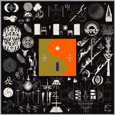 Justin Vernon is widely beloved for constructing heartfelt pastorals, but on 22, A Million, the artist radically altered the blueprint. Many of the songs aren’t so much musical recordings as fever dreams, lyrical themes and song structures just beyond grasp. In fact, if you haven’t read about the painstaking care that went into creating these tracks, you’d think they were damn near stream-of-consciousness. Not only that, the third LP from the Wisconsin artist is in turns vintage and futuristic. Vocals and instruments of indistinct make and model can sound as if piped through staticky, 1940s radio. Other times, bleeps, blurps and chipmunk soul suggest a Kanye recording session on an alien planet. There are spells of free jazz that would make Ornette Coleman appear the model of rules and restraint, wheezy, old-timey nightclub blues and even a straightforward, singalong lullaby. It’s a confounding, fascinating record. Some have declared it an overindulgence, a vanity exercise, or accuse 22, A Million of sounding unfinished. Others will proclaim its unorthodox brilliance, call it a groundbreaking recording, or say it doesn’t so much break the mold as toss it into an industrial furnace. Truth is, every one of these assessments would be right on the nose. —Matt Ryan
Justin Vernon is widely beloved for constructing heartfelt pastorals, but on 22, A Million, the artist radically altered the blueprint. Many of the songs aren’t so much musical recordings as fever dreams, lyrical themes and song structures just beyond grasp. In fact, if you haven’t read about the painstaking care that went into creating these tracks, you’d think they were damn near stream-of-consciousness. Not only that, the third LP from the Wisconsin artist is in turns vintage and futuristic. Vocals and instruments of indistinct make and model can sound as if piped through staticky, 1940s radio. Other times, bleeps, blurps and chipmunk soul suggest a Kanye recording session on an alien planet. There are spells of free jazz that would make Ornette Coleman appear the model of rules and restraint, wheezy, old-timey nightclub blues and even a straightforward, singalong lullaby. It’s a confounding, fascinating record. Some have declared it an overindulgence, a vanity exercise, or accuse 22, A Million of sounding unfinished. Others will proclaim its unorthodox brilliance, call it a groundbreaking recording, or say it doesn’t so much break the mold as toss it into an industrial furnace. Truth is, every one of these assessments would be right on the nose. —Matt Ryan
……………………………………………………………………………………………………….
16. The Avalanches | Wildflower (Astralwerks/XL)
 If Happy Mondays were Antipodean rather than Mancunian and plied their wares using turntables and samplers rather than spaced-out guitars, Bez and buckets of ecstasy, they’d be the Avalanches. After a gestation period of nearly 16 years, Wildflower comes on like a hip-hop, time-machine-traveling 24 Hour Party People, a psychedelic casserole disguising its utterly mutinous agenda beneath layers of deceptively pleasant dance beats, samples pulled from a million different eras of vinyl and guest spots ranging from Danny Brown to Mercury Rev to Royal Trux. For fans convinced that the group was incapable of creating something as transcendent as “Frontier Psychiatrist” ever again, cuts like “Subways,” “If I Was a Folkstar” and “Colours” put to rest the notion that the Avalanches had evolved into little more than an internet-based fictional endeavor. A triumph of will, patience and sheer bloody-minded creativity, Wildflower is almost enough to make you bust out your flares and Hacienda T-shirt again. Call the cops. —Corey duBrowa
If Happy Mondays were Antipodean rather than Mancunian and plied their wares using turntables and samplers rather than spaced-out guitars, Bez and buckets of ecstasy, they’d be the Avalanches. After a gestation period of nearly 16 years, Wildflower comes on like a hip-hop, time-machine-traveling 24 Hour Party People, a psychedelic casserole disguising its utterly mutinous agenda beneath layers of deceptively pleasant dance beats, samples pulled from a million different eras of vinyl and guest spots ranging from Danny Brown to Mercury Rev to Royal Trux. For fans convinced that the group was incapable of creating something as transcendent as “Frontier Psychiatrist” ever again, cuts like “Subways,” “If I Was a Folkstar” and “Colours” put to rest the notion that the Avalanches had evolved into little more than an internet-based fictional endeavor. A triumph of will, patience and sheer bloody-minded creativity, Wildflower is almost enough to make you bust out your flares and Hacienda T-shirt again. Call the cops. —Corey duBrowa
……………………………………………………………………………………………………….
15. Angel Olsen | My Woman (Jagjaguwar)
 Angel Olsen has one of those voices. She can belt her songs out, but her control is excellent. This is someone who knows just when to make that voice whisper secrets or tear a hole through the sky. Her third album, My Woman, proved to be one of those perfectly timed I-have-arrived moments. The LP spins through several genres, from ’80s balladry (“Intern”) to David Lynch-ian retro pop (“Never Be Mine” and “Shut Up Kiss Me”) to indie-rock epics (“Sister” and “Woman”), but it never feels disjointed or overstuffed. Part of that is a credit to Olsen’s vocal prowess, but it’s also due to her songwriting and how it conveys desire and fear in a way that is both very specific and utterly universal. “Doesn’t matter who you are or what you’ve done,” she sings on “Intern.” “Still got to wake up and be someone.” It’s a little hard to imagine anyone not deriving something out of a lyric like that. And the last line of My Woman lingers long after it ends and handily sums up the album’s dark allure: “I’ll be the thing that lives in the dream when it’s gone.” —Michael Pelusi
Angel Olsen has one of those voices. She can belt her songs out, but her control is excellent. This is someone who knows just when to make that voice whisper secrets or tear a hole through the sky. Her third album, My Woman, proved to be one of those perfectly timed I-have-arrived moments. The LP spins through several genres, from ’80s balladry (“Intern”) to David Lynch-ian retro pop (“Never Be Mine” and “Shut Up Kiss Me”) to indie-rock epics (“Sister” and “Woman”), but it never feels disjointed or overstuffed. Part of that is a credit to Olsen’s vocal prowess, but it’s also due to her songwriting and how it conveys desire and fear in a way that is both very specific and utterly universal. “Doesn’t matter who you are or what you’ve done,” she sings on “Intern.” “Still got to wake up and be someone.” It’s a little hard to imagine anyone not deriving something out of a lyric like that. And the last line of My Woman lingers long after it ends and handily sums up the album’s dark allure: “I’ll be the thing that lives in the dream when it’s gone.” —Michael Pelusi
……………………………………………………………………………………………………….
14. Radiohead | A Moon Shaped Pool (XL)
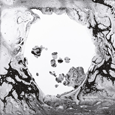 Even after a five-year wait between albums, it’s weirdly easy to take Radiohead for granted. Maybe it’s a slight tempering of expectations following 2011’s worthy but rather prickly King Of Limbs; maybe it’s the inevitable byproduct of maintaining such absurdly high consistency and commitment to innovation even now, well into its third decade. As with In Rainbows, its closest cousin in the band’s discography, A Moon Shaped Pool suffered somewhat from the attention-grabbing circumstances of its release; a splashy event incongruous with a work of art of such tender nuance and intimacy. But months removed from the initial hoopla and so many rushed post-drop thinkpiece assessments, it’s clear that the album meets (or exceeds) any level of anticipation. At first, LP9 seems to offer, essentially, no surprises: merely the most Radiohead-ish Radiohead since Hail To The Thief. But there are deep currents beneath that lustrous surface. In its myriad enticing avenues for close-read interpretation and, especially, in its decisive, revelatory reworkings of long-unfinished material, there’s ample catnip for the diehards and the nostalgiacs. —K. Ross Hoffman
Even after a five-year wait between albums, it’s weirdly easy to take Radiohead for granted. Maybe it’s a slight tempering of expectations following 2011’s worthy but rather prickly King Of Limbs; maybe it’s the inevitable byproduct of maintaining such absurdly high consistency and commitment to innovation even now, well into its third decade. As with In Rainbows, its closest cousin in the band’s discography, A Moon Shaped Pool suffered somewhat from the attention-grabbing circumstances of its release; a splashy event incongruous with a work of art of such tender nuance and intimacy. But months removed from the initial hoopla and so many rushed post-drop thinkpiece assessments, it’s clear that the album meets (or exceeds) any level of anticipation. At first, LP9 seems to offer, essentially, no surprises: merely the most Radiohead-ish Radiohead since Hail To The Thief. But there are deep currents beneath that lustrous surface. In its myriad enticing avenues for close-read interpretation and, especially, in its decisive, revelatory reworkings of long-unfinished material, there’s ample catnip for the diehards and the nostalgiacs. —K. Ross Hoffman
……………………………………………………………………………………………………….
13. Cass McCombs | Mangy Love (Anti-)
 Mangy Love is a slippery album, by turns didactic and Dada-esque, sensitive and pissed-off, somber and humorous. Cass McCombs has made a career of being unpredictable, with collections of acoustic folk rock, churning psychedelia, twangy alt-country and lo-fi home recordings. While it seems like he may just be casually following his muse, his albums are thoughtful and full of subtle, lasting riches. And Mangy Love is his best yet, a meditation on gender politics, love and healing that’s full of unexpected twists, word games and inside jokes. “It is not wealth to have more than others/It is not peace when others are in pain,” he sings, sounding like a Marxist preacher. He plays a mopey pessimist (“Mine is an opposite house, rain on the inside when it’s sunny out”) and a persuasive optimist (“Laughter is the best medicine”; perhaps a mantra for the album). The music is also slippery. Although anchored in an easygoing groove—McCombs grew up in Grateful Dead-centric Northern California—songs can include a reggae interlude or can veer into Shuggie Otis-style psychedelic soul. It’s hard to get a bead on Mangy Love, and that’s its power and its joy. —Steve Klinge
Mangy Love is a slippery album, by turns didactic and Dada-esque, sensitive and pissed-off, somber and humorous. Cass McCombs has made a career of being unpredictable, with collections of acoustic folk rock, churning psychedelia, twangy alt-country and lo-fi home recordings. While it seems like he may just be casually following his muse, his albums are thoughtful and full of subtle, lasting riches. And Mangy Love is his best yet, a meditation on gender politics, love and healing that’s full of unexpected twists, word games and inside jokes. “It is not wealth to have more than others/It is not peace when others are in pain,” he sings, sounding like a Marxist preacher. He plays a mopey pessimist (“Mine is an opposite house, rain on the inside when it’s sunny out”) and a persuasive optimist (“Laughter is the best medicine”; perhaps a mantra for the album). The music is also slippery. Although anchored in an easygoing groove—McCombs grew up in Grateful Dead-centric Northern California—songs can include a reggae interlude or can veer into Shuggie Otis-style psychedelic soul. It’s hard to get a bead on Mangy Love, and that’s its power and its joy. —Steve Klinge
……………………………………………………………………………………………………….
12. Mitski | Puberty 2 (Dead Oceans)
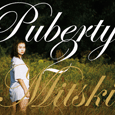 For Mitski Miyawaki, happiness is neither a self-evident truth nor an unalienable right, instead a boorish lout who eats her cookies, drinks her tea, grabs her by the pussy (Trump paraphrasing) and leaves. Twenty years after Rivers Cuomo invaded our collective privacy, turning his own misery into others’ delight, this half-Japanese woman finally gets her cold-dished reply, and it’s both harmonious and harmful, a graphic artist filleting the most violent connotations of a crush: Its flickering drone footage of her failed relationships pitched as a selfie snuff film, its love-shivved antiheroine bleeding out to a beat. As with puberty one, there are moments on this album that hit like C-4 in your chest and an elevator to the head. Following “Fireworks” with “Your Best American Girl” is an emo pile-on of Cap’n Jazz proportions, but Mitski’s just getting warm. “I wanna see the whole world!” she rages on “My Body’s Made Of Crushed Little Stars”—betraying a redlining, Neutral Milk Hotel-squatting arsonist at heart—and yet her range, from airy arias to Pixies-dusted punk, suggests that at age 26, she’s already been there and done that. —Noah Bonaparte Pais
For Mitski Miyawaki, happiness is neither a self-evident truth nor an unalienable right, instead a boorish lout who eats her cookies, drinks her tea, grabs her by the pussy (Trump paraphrasing) and leaves. Twenty years after Rivers Cuomo invaded our collective privacy, turning his own misery into others’ delight, this half-Japanese woman finally gets her cold-dished reply, and it’s both harmonious and harmful, a graphic artist filleting the most violent connotations of a crush: Its flickering drone footage of her failed relationships pitched as a selfie snuff film, its love-shivved antiheroine bleeding out to a beat. As with puberty one, there are moments on this album that hit like C-4 in your chest and an elevator to the head. Following “Fireworks” with “Your Best American Girl” is an emo pile-on of Cap’n Jazz proportions, but Mitski’s just getting warm. “I wanna see the whole world!” she rages on “My Body’s Made Of Crushed Little Stars”—betraying a redlining, Neutral Milk Hotel-squatting arsonist at heart—and yet her range, from airy arias to Pixies-dusted punk, suggests that at age 26, she’s already been there and done that. —Noah Bonaparte Pais
……………………………………………………………………………………………………….
11. Drive-By Truckers | American Band (ATO)
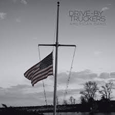 It’s been an annus horribilis of Nasty Women and Bad Hombres, aggressive groping and building a wall and making them pay for it, birthers, election rigging and Rosie O’Donnell nightmares. And look at the mess we’re in. In this spring, summer and fall of our collective discontent, the Drive-By Truckers have created the perfectly postmodern soundtrack for our election-year anger and regret, a ringing, distorted, guitar-dominated album brimming with frustration, wounded pride and stories pulled from across this great, pained land of ours. In a year marked by protest music from artists as commercially prominent as Kendrick and Beyoncé, the Truckers have somehow managed to pull the best record of their two decades together from out of the cloudy clusterfuck that is the USA circa now: a country divided by suspicion, fear and existential dread, with its camps given a voice as loud as the slogans in which they’ve been trading for the past 24 months. “Made it back from hell’s attack in some distant bloody war/Only to stare down hell back home,” sings Mike Cooley, his red-eyed and true-blue colors shining through the darkness. A modern American masterpiece. —Corey duBrowa
It’s been an annus horribilis of Nasty Women and Bad Hombres, aggressive groping and building a wall and making them pay for it, birthers, election rigging and Rosie O’Donnell nightmares. And look at the mess we’re in. In this spring, summer and fall of our collective discontent, the Drive-By Truckers have created the perfectly postmodern soundtrack for our election-year anger and regret, a ringing, distorted, guitar-dominated album brimming with frustration, wounded pride and stories pulled from across this great, pained land of ours. In a year marked by protest music from artists as commercially prominent as Kendrick and Beyoncé, the Truckers have somehow managed to pull the best record of their two decades together from out of the cloudy clusterfuck that is the USA circa now: a country divided by suspicion, fear and existential dread, with its camps given a voice as loud as the slogans in which they’ve been trading for the past 24 months. “Made it back from hell’s attack in some distant bloody war/Only to stare down hell back home,” sings Mike Cooley, his red-eyed and true-blue colors shining through the darkness. A modern American masterpiece. —Corey duBrowa
……………………………………………………………………………………………………….
10. Dinosaur Jr | Give A Glimpse Of What Yer Not (Jagjaguwar)
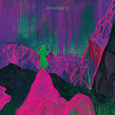 Consider, if you will, two bands from Massachusetts that formed in the mid-’80s, broke up for more than a decade, reunited and began releasing new music in the aughts. One of these groups has grown more vital, even louder with time, while the other has shown steady, middle-aged decline. What accounts for this? Perhaps it’s the fact that the best Pixies music was so tied to Black Francis’ youthful, unhinged shriek, now significantly diminished with age. Meanwhile, J Mascis’ creaky Dylan-meets-Young affect has been immune to the ravages of time. Perhaps you can point to the Pixies losing Kim Deal, while Dinosaur Jr’s original rhythm section of Murph and Barlow remains a formidable, tightly coupled force. Of course, having an idiot-savant guitar god in your band doesn’t hurt either. One is reminded that former guitar deity Eric Clapton descended into milquetoast-y irrelevance in his 50s, while Give A Glimpse Of What Yer Not still hears Mascis as a purveyor of fireworks displays that would put the Zambellis to shame. In short, on its 11th LP, Dinosaur Jr does what it has done best for the past 30-plus years, which is to remind us of the life-giving force of guitar, bass, drums and scary-big stack of Marshall amps. —Matt Ryan
Consider, if you will, two bands from Massachusetts that formed in the mid-’80s, broke up for more than a decade, reunited and began releasing new music in the aughts. One of these groups has grown more vital, even louder with time, while the other has shown steady, middle-aged decline. What accounts for this? Perhaps it’s the fact that the best Pixies music was so tied to Black Francis’ youthful, unhinged shriek, now significantly diminished with age. Meanwhile, J Mascis’ creaky Dylan-meets-Young affect has been immune to the ravages of time. Perhaps you can point to the Pixies losing Kim Deal, while Dinosaur Jr’s original rhythm section of Murph and Barlow remains a formidable, tightly coupled force. Of course, having an idiot-savant guitar god in your band doesn’t hurt either. One is reminded that former guitar deity Eric Clapton descended into milquetoast-y irrelevance in his 50s, while Give A Glimpse Of What Yer Not still hears Mascis as a purveyor of fireworks displays that would put the Zambellis to shame. In short, on its 11th LP, Dinosaur Jr does what it has done best for the past 30-plus years, which is to remind us of the life-giving force of guitar, bass, drums and scary-big stack of Marshall amps. —Matt Ryan
……………………………………………………………………………………………………….
9. Beach Slang | A Loud Bash Of Teenage Feelings (Polyvinyl/Big Scary Monsters)
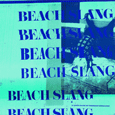 “Play it loud/Play it fast/Play me something that will always last,” growls lead singer James Alex on “Future Mixtape For The Art Kids,” the first track on Beach Slang’s A Loud Bash Of Teenage Feelings. The song lays out the manifesto for his band and the album. It’s been a long time since Alex was a teenager, but he’s able to capture the rush of intoxicating optimism and overwhelming hopelessness that make those years of young adulthood resonate with most of us for the rest of our lives. The band plays the tunes with a blazing energy that makes the often over-the-top angst that fuels them take on a compelling reality. Most are muscular, stripped-down rockers, but even when Alex and the band slow the tempo down on numbers like “Young Hearts” and “Warpaint,” the lyrics bristle with the bewildering confusion of youth. Alex steps out of the shadows near the end of the record to deliver “The Perfect High,” a song that celebrates the fearless exuberance of first love. When he sings, “I’m not dead, and you are why/You’re the perfect high,” it’s a transcendent moment. —j. poet
“Play it loud/Play it fast/Play me something that will always last,” growls lead singer James Alex on “Future Mixtape For The Art Kids,” the first track on Beach Slang’s A Loud Bash Of Teenage Feelings. The song lays out the manifesto for his band and the album. It’s been a long time since Alex was a teenager, but he’s able to capture the rush of intoxicating optimism and overwhelming hopelessness that make those years of young adulthood resonate with most of us for the rest of our lives. The band plays the tunes with a blazing energy that makes the often over-the-top angst that fuels them take on a compelling reality. Most are muscular, stripped-down rockers, but even when Alex and the band slow the tempo down on numbers like “Young Hearts” and “Warpaint,” the lyrics bristle with the bewildering confusion of youth. Alex steps out of the shadows near the end of the record to deliver “The Perfect High,” a song that celebrates the fearless exuberance of first love. When he sings, “I’m not dead, and you are why/You’re the perfect high,” it’s a transcendent moment. —j. poet
……………………………………………………………………………………………………….
8. Lucinda Williams | The Ghosts Of Highway 20 (Highway 20)
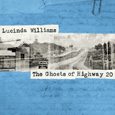 Lucinda Williams has been making music for nearly four decades. The Ghosts Of Highway 20, her 12th studio album, is a record that honors that long history of styles and subjects, while leaning heavily into the minor-key introspection that’s arguably her greatest strength. Williams can write boozy rockers and barn-burning stompers, but she can write the hell out of songs about people kicking and fighting like mad to escape the circumstances they’ve found themselves in, and that’s what Ghosts is all about—the moments when its characters find themselves going through hell and decide the way out is the way through. Or maybe not; maybe “out” is only wishful thinking, and hell’s where we’re going to be for a while. This would seem like grim stuff, except Williams is among the least sentimental songwriters in contemporary music (“I know about the pain/And all that jazz”). Even the sternest moments on Ghosts are delivered with a wry self-deprecation, and the gentler ones (“Place In My Heart,” “Can’t Close The Door On Love”) exhibit the same tendency to restraint over sentiment. This isn’t an album about the highs and lows but about the middle zone, the region you have to move through to get to the next place. If we’re going to hell, we might as well go together. —Eric Waggoner
Lucinda Williams has been making music for nearly four decades. The Ghosts Of Highway 20, her 12th studio album, is a record that honors that long history of styles and subjects, while leaning heavily into the minor-key introspection that’s arguably her greatest strength. Williams can write boozy rockers and barn-burning stompers, but she can write the hell out of songs about people kicking and fighting like mad to escape the circumstances they’ve found themselves in, and that’s what Ghosts is all about—the moments when its characters find themselves going through hell and decide the way out is the way through. Or maybe not; maybe “out” is only wishful thinking, and hell’s where we’re going to be for a while. This would seem like grim stuff, except Williams is among the least sentimental songwriters in contemporary music (“I know about the pain/And all that jazz”). Even the sternest moments on Ghosts are delivered with a wry self-deprecation, and the gentler ones (“Place In My Heart,” “Can’t Close The Door On Love”) exhibit the same tendency to restraint over sentiment. This isn’t an album about the highs and lows but about the middle zone, the region you have to move through to get to the next place. If we’re going to hell, we might as well go together. —Eric Waggoner
……………………………………………………………………………………………………….
7. Car Seat Headrest | Teens Of Denial (Matador)
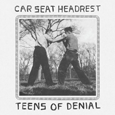 We don’t need another new Bob Dylan, Nobel laureate notwithstanding. But we sure can welcome a new Bob Pollard. Although Teens Of Denial is his first “real” album—created in a studio with an outside producer (Steve Fisk), conceived as a coherent group of tunes and intended for wide release—Car Seat Headrest’s Will Toledo is a song machine who’d recorded 12 albums (sometimes in his car’s backseat) that he posted on Bandcamp (some of those songs were assembled for 2015’s Teens Of Style). The leap in production values is akin to Guided By Voices’ on Do The Collapse, which the Cars’ Ric Ocasek produced: These songs rock with a fuzzy-yet-clear intensity; they retain their DIY spirit, but the focus is sharper, as are the hooks, even when songs stretch past the seven-minute mark. Ocasek, however, is a villain in the CSH story: After some permissions confusion about the use of “Just What I Needed” in one song, Ocasek denied access, which caused Matador to destroy all the initial pressings on the eve of release. Toledo quickly recorded a new, equally superb version of “Not Just What I Needed,” so all’s good now. Pollard, thankfully, isn’t ready to pass his torch (or lighter or beer cooler). But Teens Of Denial proves that Toledo and Car Seat Headrest are heirs apparent. —Steve Klinge
We don’t need another new Bob Dylan, Nobel laureate notwithstanding. But we sure can welcome a new Bob Pollard. Although Teens Of Denial is his first “real” album—created in a studio with an outside producer (Steve Fisk), conceived as a coherent group of tunes and intended for wide release—Car Seat Headrest’s Will Toledo is a song machine who’d recorded 12 albums (sometimes in his car’s backseat) that he posted on Bandcamp (some of those songs were assembled for 2015’s Teens Of Style). The leap in production values is akin to Guided By Voices’ on Do The Collapse, which the Cars’ Ric Ocasek produced: These songs rock with a fuzzy-yet-clear intensity; they retain their DIY spirit, but the focus is sharper, as are the hooks, even when songs stretch past the seven-minute mark. Ocasek, however, is a villain in the CSH story: After some permissions confusion about the use of “Just What I Needed” in one song, Ocasek denied access, which caused Matador to destroy all the initial pressings on the eve of release. Toledo quickly recorded a new, equally superb version of “Not Just What I Needed,” so all’s good now. Pollard, thankfully, isn’t ready to pass his torch (or lighter or beer cooler). But Teens Of Denial proves that Toledo and Car Seat Headrest are heirs apparent. —Steve Klinge
……………………………………………………………………………………………………….
6. Nick Cave & The Bad Seeds | The Skeleton Tree (Bad Seed Ltd)
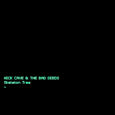 It’s impossible to tell how the death of Nick Cave’s son, Arthur, during the recording of The Skeleton Tree shaped its final form, and impossible to know exactly how the grief of such a loss was bodied forth into sound by an artist whose entire catalog is, among other things, a long meditation on death and the death drive. It’s also impossible to say whether the stripped-down production is what permits the songs’ emphasis on the mysteries of loss to shine more clearly than they have on the band’s previous albums. The Skeleton Tree is about all of these impossibilities, and more. At times, the music seems so weighty there could be nothing heavier. At others, it lifts and soars, pulled up and aloft by Cave’s voice, here so restrained, so measured and so stately. This isn’t the blood-and-thunder Cave of “Tupelo” and “Jack The Ripper” but rather the aching bystander of “God Is In The House” and “Push The Sky Away,” the one who sees the scope of tragedy and chooses to meet it with a reserve and calm precision that somehow feels the only appropriate emotive register. Impossible to know why we’re made to suffer; impossible to know why we’re given the gift of song to help us bear it. Enough that we have it, in all its terrible and humbling beauty. —Eric Waggoner
It’s impossible to tell how the death of Nick Cave’s son, Arthur, during the recording of The Skeleton Tree shaped its final form, and impossible to know exactly how the grief of such a loss was bodied forth into sound by an artist whose entire catalog is, among other things, a long meditation on death and the death drive. It’s also impossible to say whether the stripped-down production is what permits the songs’ emphasis on the mysteries of loss to shine more clearly than they have on the band’s previous albums. The Skeleton Tree is about all of these impossibilities, and more. At times, the music seems so weighty there could be nothing heavier. At others, it lifts and soars, pulled up and aloft by Cave’s voice, here so restrained, so measured and so stately. This isn’t the blood-and-thunder Cave of “Tupelo” and “Jack The Ripper” but rather the aching bystander of “God Is In The House” and “Push The Sky Away,” the one who sees the scope of tragedy and chooses to meet it with a reserve and calm precision that somehow feels the only appropriate emotive register. Impossible to know why we’re made to suffer; impossible to know why we’re given the gift of song to help us bear it. Enough that we have it, in all its terrible and humbling beauty. —Eric Waggoner
……………………………………………………………………………………………………….
5. GOAT | Requiem (Sub Pop)
 GOAT has been trying to convince us that the tiny hamlet from which it hails is home to an ages-old curse placed by a traveling witch doctor who introduced small-town Sweden to voodoo and the joys of commune living, with the associated sounds of such being passed down through generations and appearing on each of the band’s three albums. As improbable as this story is, on Requiem, the sonic aesthetic is more communal and rural than what you’d expect from a band with a few years of studio and road work under its belt. The mood feels like a loose, campfire jam during which random participants add layers using whatever’s on hand and mind. The result is an inexact yet absorbing and entrancing, work. The waves of tribal drums, fluttering flutes, percussion and electric instruments has the collective taking its world-music experiment a step toward Woodstock with the melodies on “All-Seeing Eye” and “I Sing In Silence” being as powerful as they are hypnotic and the portal to a cedar-scented, space-age hippie ritual. And if there really was a witch doctor who bestowed the gift of cultlike sound upon GOAT, he’s likely looking down from a wispy, purple-hazed cloud with a toothy grin. —Kevin Stewart-Panko
GOAT has been trying to convince us that the tiny hamlet from which it hails is home to an ages-old curse placed by a traveling witch doctor who introduced small-town Sweden to voodoo and the joys of commune living, with the associated sounds of such being passed down through generations and appearing on each of the band’s three albums. As improbable as this story is, on Requiem, the sonic aesthetic is more communal and rural than what you’d expect from a band with a few years of studio and road work under its belt. The mood feels like a loose, campfire jam during which random participants add layers using whatever’s on hand and mind. The result is an inexact yet absorbing and entrancing, work. The waves of tribal drums, fluttering flutes, percussion and electric instruments has the collective taking its world-music experiment a step toward Woodstock with the melodies on “All-Seeing Eye” and “I Sing In Silence” being as powerful as they are hypnotic and the portal to a cedar-scented, space-age hippie ritual. And if there really was a witch doctor who bestowed the gift of cultlike sound upon GOAT, he’s likely looking down from a wispy, purple-hazed cloud with a toothy grin. —Kevin Stewart-Panko
……………………………………………………………………………………………………….
4. William Tyler | Modern Country (Merge)
 While it could serve beautifully to soundtrack any number of settings and situations, the genre-straddling Nashville guitarist’s latest opus is particularly well suited to the open road; it seems somehow self-evident that the second word in its title refers not to musical categories or nation-states (even if this is deeply, indelibly American music) but simply to the countryside—a point emphasized by the gently trippy road-movie video for the serenely majestic “Highway Anxiety.” William Tyler sometimes gets lumped in with the Fahey-ist American Primitive types, and he’s plenty proficient as picker. But this album isn’t at all about technique or soloistic flash—even “Kingdom Of Jones,” the lone acoustic fingerstyle rag, is relatively restrained. Rather, it’s the fullest blossoming yet of Tyler’s gifts as a texturalist, a small ensemble composer and, above all, a melodist. If there’s a clear point of comparison, it’s Bill Frisell’s phenomenal turn-of-the-century Americana albums, which approached similar sonic landscapes from the opposite side of the (imaginary) jazz/folk “divide.” But Tyler’s on his own trip here, one that’s rustic and graceful; economical yet expansive; modern, sure—but, more importantly, timeless. —K. Ross Hoffman
While it could serve beautifully to soundtrack any number of settings and situations, the genre-straddling Nashville guitarist’s latest opus is particularly well suited to the open road; it seems somehow self-evident that the second word in its title refers not to musical categories or nation-states (even if this is deeply, indelibly American music) but simply to the countryside—a point emphasized by the gently trippy road-movie video for the serenely majestic “Highway Anxiety.” William Tyler sometimes gets lumped in with the Fahey-ist American Primitive types, and he’s plenty proficient as picker. But this album isn’t at all about technique or soloistic flash—even “Kingdom Of Jones,” the lone acoustic fingerstyle rag, is relatively restrained. Rather, it’s the fullest blossoming yet of Tyler’s gifts as a texturalist, a small ensemble composer and, above all, a melodist. If there’s a clear point of comparison, it’s Bill Frisell’s phenomenal turn-of-the-century Americana albums, which approached similar sonic landscapes from the opposite side of the (imaginary) jazz/folk “divide.” But Tyler’s on his own trip here, one that’s rustic and graceful; economical yet expansive; modern, sure—but, more importantly, timeless. —K. Ross Hoffman
……………………………………………………………………………………………………….
3. case/lang/veirs | case/lang/veirs (Anti-)
 How could any one-off supergroup ever aspire to be more than the sum of its parts, even one that combines the idiosyncratic talents of Neko Case, k.d. lang and Laura Veirs? Yet case/lang/veirs’ self-titled album is a winning argument for individuals being stronger together in a year when we so desperately needed that sentiment to be true. It works by giving each woman enough space to do what she does best with solid sonic support from a punchy backing band (including Wilco drummer Glenn Kotche), a pair of string sections and exquisite backing vocals from her counterparts. Case is as guarded and tender as ever when she takes the lead on tracks like “Supermoon,” while lang’s languid, longing voice turns everything she touches into a torch song, whether her doomed lovers are separated by a dance floor (“Honey And Smoke”) or something more tangible (“1,000 Miles Away”). And though Veirs, the only contributor with full or partial songwriting credit on all 14 tracks, keeps the most accessible moment (“Best Kept Secret”) to herself, it’s the opening “Atomic Number” that serves as the most majestic, enduring proof of this chemistry experiment gone oh so right. —M.J. Fine
How could any one-off supergroup ever aspire to be more than the sum of its parts, even one that combines the idiosyncratic talents of Neko Case, k.d. lang and Laura Veirs? Yet case/lang/veirs’ self-titled album is a winning argument for individuals being stronger together in a year when we so desperately needed that sentiment to be true. It works by giving each woman enough space to do what she does best with solid sonic support from a punchy backing band (including Wilco drummer Glenn Kotche), a pair of string sections and exquisite backing vocals from her counterparts. Case is as guarded and tender as ever when she takes the lead on tracks like “Supermoon,” while lang’s languid, longing voice turns everything she touches into a torch song, whether her doomed lovers are separated by a dance floor (“Honey And Smoke”) or something more tangible (“1,000 Miles Away”). And though Veirs, the only contributor with full or partial songwriting credit on all 14 tracks, keeps the most accessible moment (“Best Kept Secret”) to herself, it’s the opening “Atomic Number” that serves as the most majestic, enduring proof of this chemistry experiment gone oh so right. —M.J. Fine
……………………………………………………………………………………………………….
2. David Bowie | Blackstar (Columbia)
 Given the tragic circumstances, David Bowie could’ve uncorked a mediocre sendoff, and it would’ve likely been met with sympathetic ears. Instead, he does the appropriate thing and leaves us with Blackstar, one of the most compelling and original works in a 50-plus-year career loaded with such transcendent moments. Granted, his impending death—and the clues he offers of such—add a pained poignancy to the proceedings, especially on the wildly theatrical, heartbreakingly prescient title track: an engrossing hybrid of late-’70s Roxy Music and Bowie’s own camp-electronic collaborations with Brian Eno. Elsewhere, he’s (fittingly) dead-set on leaving behind something uncompromisingly original—albeit with morsels of his multiple former selves scattered about like a zigzagging trail of breadcrumbs, all leading back to the core genre-bending traits that defined his genius. Nothing comes easily on Blackstar. It’s an often difficult, even atonal, listen. With his consummate reputation for reinvention, who’s to say Bowie won’t keep us guessing in the afterlife? —Hobart Rowland
Given the tragic circumstances, David Bowie could’ve uncorked a mediocre sendoff, and it would’ve likely been met with sympathetic ears. Instead, he does the appropriate thing and leaves us with Blackstar, one of the most compelling and original works in a 50-plus-year career loaded with such transcendent moments. Granted, his impending death—and the clues he offers of such—add a pained poignancy to the proceedings, especially on the wildly theatrical, heartbreakingly prescient title track: an engrossing hybrid of late-’70s Roxy Music and Bowie’s own camp-electronic collaborations with Brian Eno. Elsewhere, he’s (fittingly) dead-set on leaving behind something uncompromisingly original—albeit with morsels of his multiple former selves scattered about like a zigzagging trail of breadcrumbs, all leading back to the core genre-bending traits that defined his genius. Nothing comes easily on Blackstar. It’s an often difficult, even atonal, listen. With his consummate reputation for reinvention, who’s to say Bowie won’t keep us guessing in the afterlife? —Hobart Rowland
……………………………………………………………………………………………………….
1. Lucy Dacus | No Burden (Matador)
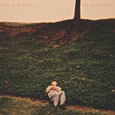 Lucy Dacus had an unfair advantage in getting our attention this year: Her debut album, No Burden, came out twice, first on Richmond’s tiny EggHunt Records in February, then on the venerable Matador in September. Recorded in one day in Nashville with a band that had just learned the songs, No Burden is not only a surprisingly assured album from a 21-year-old newcomer; it’s MAGNET’s pick for the best album of 2016. At her most placid, as on the solo-acoustic “Trust,” Dacus can sound as introspective and thoughtful as Laura Marling. But when she and her band hit a bluesy groove on, say, “Troublemaker, Doppelganger,” she exudes the cool power of the Heartless Bastards’ Erika Wennerstrom. Mostly, she sings confidently about insecurities and turns confessions into proclamations in insightful songs that gradually accrue in churning power. “I don’t want to be funny anymore/Lately, I’ve been feeling like the odd man out/I hurt my friends saying things I don’t mean out loud,” she sings, sounding weary until she locks in sync to the insistent guitars. “You got yourself a bunch of bad habits/Not hard to see that love is a weakness/Seems to me the way you understand it/Is that you’re never going to make it happen,” she sings on the swaggering, Hunter S. Thompson-quoting highlight “Strange Torpedo.” “Without you, I am surely the last of my kind,” she sings on both “Dream State” and “Familiar Place.” No Burden, however, is the first of its kind, and here’s hoping for many more. —Steve Klinge
Lucy Dacus had an unfair advantage in getting our attention this year: Her debut album, No Burden, came out twice, first on Richmond’s tiny EggHunt Records in February, then on the venerable Matador in September. Recorded in one day in Nashville with a band that had just learned the songs, No Burden is not only a surprisingly assured album from a 21-year-old newcomer; it’s MAGNET’s pick for the best album of 2016. At her most placid, as on the solo-acoustic “Trust,” Dacus can sound as introspective and thoughtful as Laura Marling. But when she and her band hit a bluesy groove on, say, “Troublemaker, Doppelganger,” she exudes the cool power of the Heartless Bastards’ Erika Wennerstrom. Mostly, she sings confidently about insecurities and turns confessions into proclamations in insightful songs that gradually accrue in churning power. “I don’t want to be funny anymore/Lately, I’ve been feeling like the odd man out/I hurt my friends saying things I don’t mean out loud,” she sings, sounding weary until she locks in sync to the insistent guitars. “You got yourself a bunch of bad habits/Not hard to see that love is a weakness/Seems to me the way you understand it/Is that you’re never going to make it happen,” she sings on the swaggering, Hunter S. Thompson-quoting highlight “Strange Torpedo.” “Without you, I am surely the last of my kind,” she sings on both “Dream State” and “Familiar Place.” No Burden, however, is the first of its kind, and here’s hoping for many more. —Steve Klinge





